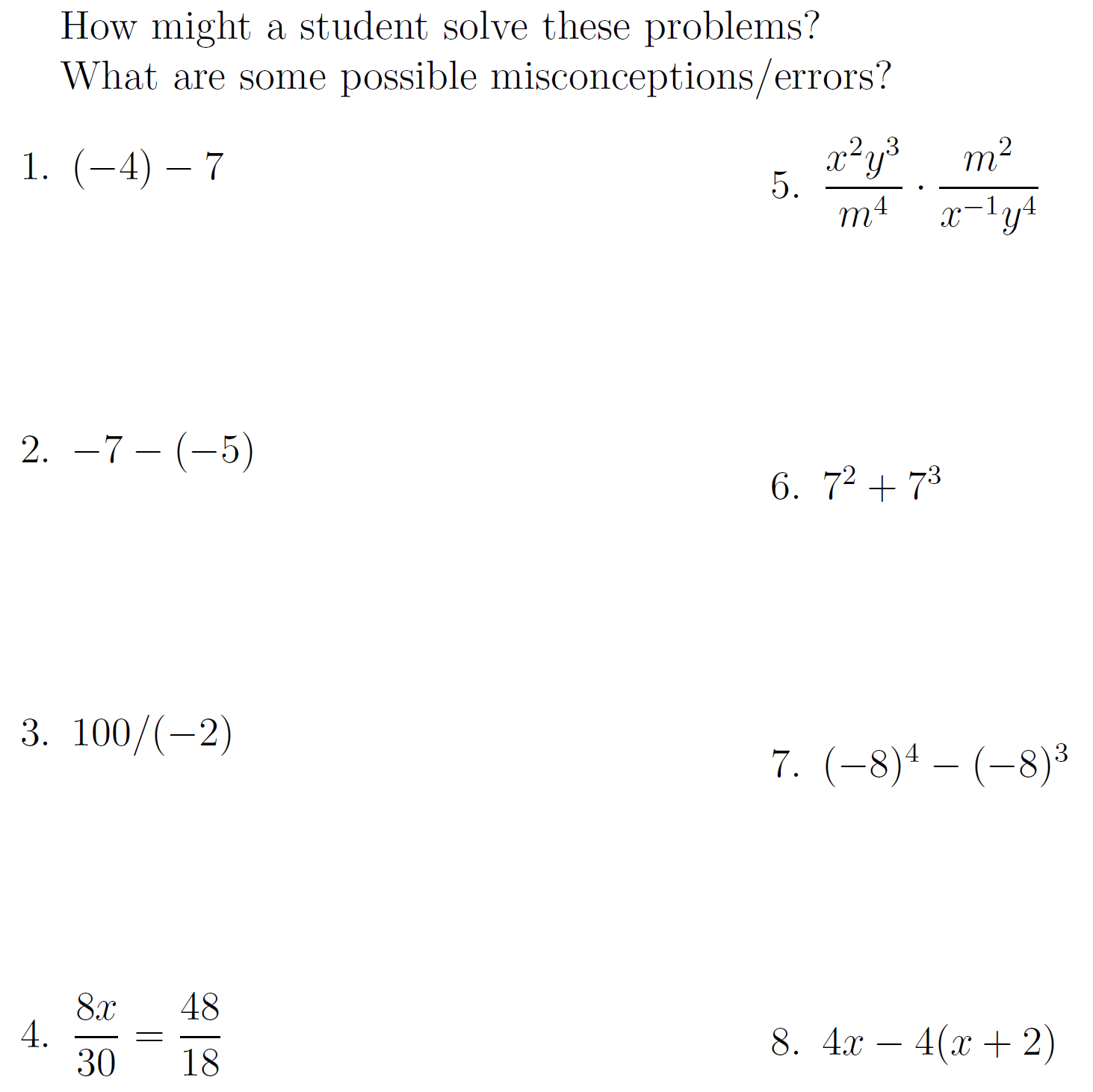We started the session with groups discussing the following problems:
They didn't know it at the time, but these were all problems that I chose from Math Mistakes with Michael's assistance because we felt the mistakes students made were a consequence of tricks they had learned. Here's a place where I need your help - I would love to have lots of examples of how students solve these problems. Having a single mistake to hold up and say, "I hypothesize this kid made this mistake for this reason." and then conclude, "Therefore no one should use tricks ever." is not good logic. But having a pile of mistakes that correlate to a variety of tricks? That would be more convincing. (I should also read those articles that I saved on research about understanding, as that's even better logic. Time has been at a real premium the past few months...) Feel free to check out the slides which match problem to mistake to trick. (Next time I plan to include more info on how to nix the tricks, not just why tricks are bad.)
We then got into some great conversations about long division, the multiple methods for teaching it and the necessity for teaching the standard algorithm in preparation for polynomial division. I love listening to people talk about areas of math I don't teach and seeing how it relates to what I know. I guess I'm not the only one:




These conversations are the aspect of Nix the Tricks that I've loved the most. People coming together to think deeply about how to teach something students find challenging. Because people don't invent tricks for things kids can do easily; tricks are in place because someone thought the understanding was too hard (for the kids or to teach). I'm wondering how to get that conversation going in a room full of teachers who don't know each other and who teach different things. There were many participants interested in this conversation but not everyone. To differentiate I could have each group pick one of the 8 problems from the beginning and decide how they would teach a lesson around that problem for understanding? But I'll have already talked about the related mistakes and tricks and how to avoid them. Although that sounds ambitious for an hour, perhaps I'll only have skimmed how to avoid them and it would make sense for people to dig deeper...
I leave you with some questions:
1) Can you give one, some or all of the 8 questions above to one, some or all of your kids (at home or in school) and then share their mistakes with me? I'll even give you a form to make it easy to share out. Also, if you know of anyone who already has this type of data I'd love to see it!
2) I don't want a Nix the Tricks presentation to be about me telling people how to teach, but instead to get people thinking and interested in engaging on the site. How can I get teachers to talk to each other in small groups about nixing tricks? Is this the best way to get people interested in having continued conversation on the topic?
I leave you with some questions:
1) Can you give one, some or all of the 8 questions above to one, some or all of your kids (at home or in school) and then share their mistakes with me? I'll even give you a form to make it easy to share out. Also, if you know of anyone who already has this type of data I'd love to see it!
2) I don't want a Nix the Tricks presentation to be about me telling people how to teach, but instead to get people thinking and interested in engaging on the site. How can I get teachers to talk to each other in small groups about nixing tricks? Is this the best way to get people interested in having continued conversation on the topic?

Ahhhhh, when I was in the classroom, I got put on probation and eventually fired for teaching kids to understand the math and not the trick. An administrator just barged into my class and told my students, "Mr. Fischman cares about you, but you will fail if you do it his way." The administrator promptly undid all the work I had done all year teaching the kids to think proportionally instead of cross-multiplying wildly with both hands. That's why I'm a math blogger(www.mathnook.com/blog) and not a math teacher anymore.
ReplyDelete